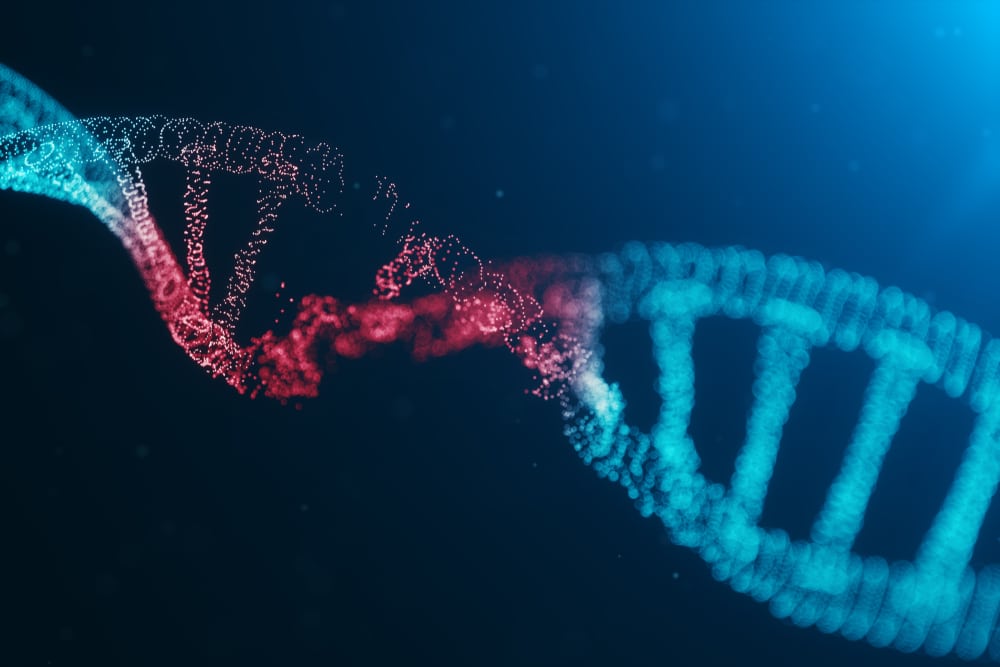

Many people assume that those struggling with addiction have loose morals, weak willpower, or are unwilling to stop. But that is certainly not the case. Addiction is a brain disease. According to the National Institute on Drug Addiction, it is a disorder that leads to “functional changes to brain circuits involved in stress, self-control, and reward.” Other reputable bodies like the Institute of Medicine, American Medical Association, and American Psychiatric Association also recognize addiction as a brain disease. Does this brain disease result from some type of genetic disorder?
Since addiction is a disease of the brain, have you ever stopped to wonder why it affects some people and not others? As it turns out, some factors such as genetics may play a role in determining whether one is likely to develop a substance use disorder. The National Institute of Health reveals that up to 50% of addiction risk is based on genetics. One is more likely to experience addiction if they have a family member who has had an addiction.

Drug addiction is a chronic brain disease. Like diabetes, heart disease, cancer, and other chronic illnesses, it can run in families. Children whose parent(s) have a substance use disorder are 2 to 4 times more likely to struggle with substance abuse issues of their own, later on in life.
The reason is that there’s an inherited component that can pass down to generations through genes. That’s why family history gives hints about one’s vulnerability to addiction.
Despite the higher risk, some people don’t end up with genetic addiction. It could be that they never inherited the genes for drugs or alcohol abuse or that their environment helped shape the specific expression of those genes. The heredity issue is also not as strong when it comes to extended family members like uncles, aunties, or grandparents who struggle with addiction.
Genetics is a risk factor for addiction and can increase the risk of drug and alcohol abuse in different ways. For starters, the genetic mutation that leads to changes in the brain’s function and structure may affect how a person responds to exposure from the substance. Secondly, a person may be genetically inclined to display temperamental and mental health issues that may escalate their chances of abusing drugs or alcohol.
A review by NIAAA experts reveals that genetic factors contribute up to 40-60% of the variance between people at risk of abusing alcohol. The genes that make one susceptible to addiction are alcohol-specific (like 1 S allele) like those that affect the brain’s reward center. Serotonin transporter polymorphism also influences addiction according to one review article dubbed Genetics, Inheritability Factors, and Addiction.
Substance abuse can change one’s brain to crave a particular substance. This is especially true for someone who uses drugs or alcohol for a long time. Even without a genetic aspect, one can still inherit a predisposition to substance abuse because of the culture they grow up in, or where use like binge drinking is encouraged.

According to scientists, some genetic predispositions may expose one to the dangers of addiction. However, not everyone with a genetic predisposition ends up being an addict. Conversely, some people can have problems even if no one in their family has substance use disorders.
Genetics is only one of the risk factors when looking at whether one has a higher risk of developing an addiction. Environmental factors like growing up with people who abuse drugs can also predispose one to the condition.
Scientists in the genetics of substance abuse field say that addiction and comorbid mental health disorders have similar neurological features. They also co-occur in more than half of those struggling with substance abuse. People with mental illnesses like anxiety, stress, depression, or social disorders are more likely to abuse drugs for various reasons.
Some use the drugs to get temporary relief from these feelings—others, for a sense of well-being and euphoria. After all, mental health and substance abuse issues affect the same parts of the brain, thereby elevating abuse potential.

Children that grow into stable homes with supportive parents tend to have a lower chance of using or abusing drugs. But if the home is unstable, has no structure, or has parents who abuse drugs or have a mental illness, then it’s highly likely that the children may use the abused drug. Young people who experience neglect or abuse from parents may also use alcohol or drugs to cope with their emotions.
The influence of friends is another common reason people end up with addiction. When one hangs out or around peers who use drugs, they are highly likely to give into the pressure of using. The availability of substances in a social circle can also affect one’s risk of developing an addiction. For example, large amounts of drugs being available in many social settings can cause one to start and continue using.
The age at which one starts to use drugs or alcohol can also be a risk factor. A survey by NIAAA found that people aged between 18 and 24 were most likely to have both drug and alcohol addictions. Abusing drugs and alcohol at a young age may also affect one’s brain development, exposing one to mental illness as they grow older and their addiction progresses.
Drugs such as meth, heroin, and cocaine tend to be more addictive than marijuana or alcohol. They also have a physically painful withdrawal phase, which can make one continue use to prevent the pain. This can increase the addiction process as well as the risk of serious health complications.
Many treatment options exist to help people with substance abuse disorders. If someone close to you needs help with the abuse of drugs or alcohol, you should help them find treatment. Health care professionals in addiction treatment facilities have the right resources to help treat genetic addiction. They will assess the person’s using pattern, their overall health, and design a treatment plan.
Since addiction often co-occurs with other conditions, your loved one may also need to undergo counseling and group therapy in addition to medications. Reputable facilities even provide after-care to help one in their journey to sobriety. Older adults with medical conditions such as a risk for heart disease or risk for severe illness should reach out today to conquer their drug or alcohol dependence.